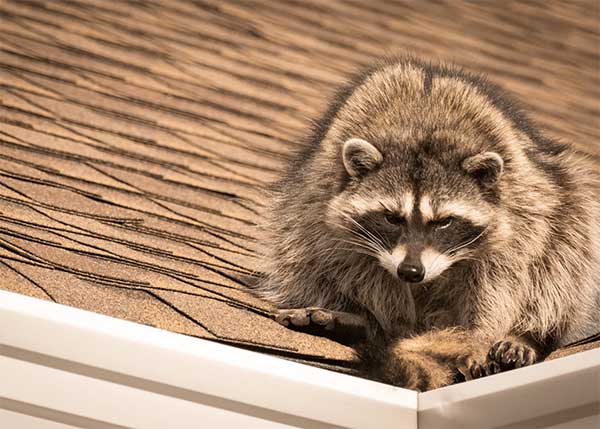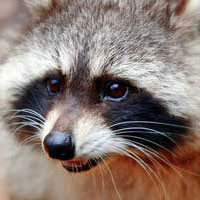
So, you woke up one morning, heard some strange noises coming from your chimney, and suddenly realized that there might be a raccoon in there?
You may be used to raccoons in your yard, but what should you do if there’s a raccoon in the chimney?
First of all, don’t panic – you’re not alone in this situation. Raccoons are crafty creatures, and chimneys are common cozy hideouts to them.
Let’s break down why raccoons find chimneys so appealing and how to go about raccoon in chimney removal.
Why Do Raccoons Go In Chimneys?
Ever wondered why raccoons venture into chimneys in the first place and make raccoon removal necessary? As cities expand and forests shrink, raccoons find themselves with fewer natural homes. So, they start seeking refuge in our buildings. Chimneys specifically tend to make perfect shelters.
Looking for Shelter (Especially Mother Raccoons)
Just like human moms, mother raccoons are always protecting their babies. So, when it’s time to raise them, they scout out safe havens, with chimneys often fitting the bill.
As mother raccoons are seeking out a warm and secure place to raise her babies without worrying about coyotes or rainstorms, chimneys somewhat resemble a hollow tree found in the woods and can offer exactly what they need. So, if you do find a raccoon in your chimney, chances are it may be a mother looking out for her little ones.
Warmth
On a chilly winter night, you likely want to be surrounded by warmth — and raccoons in chimneys are no different. They need to keep their body temperature just right, and a toasty chimney helps them do just that.
Food
Raccoons are notorious for looking for food wherever they can get it — leftover barbecue or garbage cans included. Plus, chimneys can be home to other critters like birds or rodents, which raccoons see as potential snacks. So, if you suspect a raccoon in your chimney, it might just be on a food hunt.
Escape Route
Raccoons are natural-born climbers, so shimmying up and down a chimney is a great way to escape from predators who aren’t as good at getting up high. If you remember seeing an animal darting near or into your chimney in a hurry from your home cameras, it might be in there because it was seeking refuge from a potential threat.
Now that you know a few reasons why raccoons might be in your chimney, let’s cover how to get raccoons out of chimneys.
There’s a Raccoon In My Chimney: What Do I Do?

Do NOT Light a Fire
First things first – resist the urge to light a fire in your fireplace if you suspect a raccoon is in the chimney. It might seem like a quick fix to scare the critter away, but it can end in disaster both for the raccoon and for you.
Lighting a fire can cause the raccoon to panic, become disoriented, or even suffocate, which is an inhumane way of getting rid of it. On top of that, there's the risk of igniting any debris or nesting materials in the chimney, which could lead to a chimney fire or spread flames to other parts of your home.
Open the Damper
Instead of reaching for the matches, try opening the damper in your chimney, which gives the raccoon a clear path to freedom, reducing the risk of harm to both the animal and your property. Opening the damper also lets in more light and fresh air, making it easier for the raccoon to find its way out.
Become the impossible neighbour
Raccoons typically choose chimneys and attics to settle in because they’re quiet, warm, and comfortable. Adult raccoons are afraid of loud noises, so you can try to scare them away by turning up the radio in the attic. Talk radio works better than loud music because the voices sound intimidating as raccoons are often scared of humans if they are not ill. Other effective scare tactics are bright lights, scarecrows, flashing lights, and any loud sounds in general.
Scents like various spices, ammonia, and vinegar are also excellent raccoon deterrents as they create a very unpleasant and uninviting environment for raccoons.
Install a Damper/Chimney Cap
This should happen after you’ve evicted the raccoon: thinking about preventing a repeat visit.
If you didn’t have a chimney cap or damper already, it’s like putting a "no raccoon in chimney allowed" sign on your home, blocking critters from sneaking back in while still allowing proper ventilation.
How much does it cost to remove raccoons from chimney?
The cost to remove raccoons from a chimney can vary depending on several factors, including the location, the number of raccoons, and the removal method used.
On average, you can expect to pay between $300 and $700 for a one-time visit. However, the cost can be higher if there are multiple raccoons or if additional services, such as cleaning up debris or repairing damage, are needed.
It's best to contact a wildlife removal service in your area for an accurate estimate.
Should I try to remove a raccoon from my chimney before calling animal control?
No, we don’t recommend trying to remove a raccoon from your chimney yourself. Raccoons can be aggressive (especially, in tight spaces where they may feel cornered) and may carry diseases, so it's best to leave removal to trained professionals who have proper equipment for removal. Calling animal control or a wildlife removal service is by far the safest and most effective way to handle a raccoon in your chimney.
Hire a Hawkeye Professional
When all else fails, it's time to bring in the professionals at Hawkeye Bird & Animal Control. We have all the equipment we need for any raccoon in chimney scenarios, including the equipment and training to get them and keep them out.
Reach out to us today for raccoon removal so you don’t have to try DIYing getting a raccoon out of your chimney.
Related Articles:
https://www.hawkeye.ca/blog/are-raccoon-repellents-mothballs-ammonia-lights-effective
https://www.hawkeye.ca/blog/how-to-get-rid-of-raccoons-on-fire-escapes
















